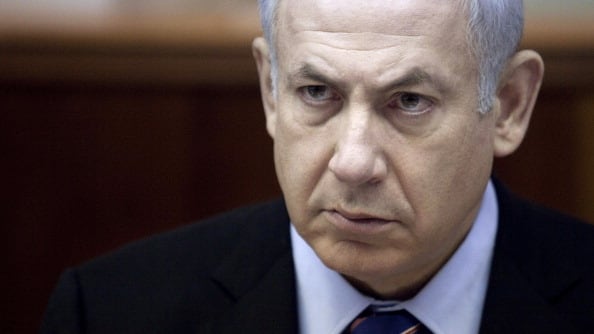“Those in the international community who refuse to put red lines before Iran don’t have a moral right to place a red light before Israel.” So says Benjamin Netanyahu, which, in a convoluted way, I admit, brought to mind an old Zionist joke:
Two Jews are walking down a sidewalk in Odessa; two Russian peasants are walking toward them. “What are we going to do?” one Jew says to the other; “There are two of them and we’re alone!”

Not so funny anymore, is it?—not, at least, when you think of its punch-line’s pathos as a rationale for, of all things, the Zionist movement’s eventual state launching a preemptive regional war, likely to cost countless thousands of lives in Iran, Israel, and South Lebanon.
Netanyahu’s policy—let us be clear—is not based on the presumption that, if Iran gets a bomb, the ayatollahs will turn around and use it against Israel. Israel has a hundred nuclear weapons and the means to retaliate. As I argued here recently—and many Israeli intelligence and military leaders have argued in their turn—it is mad (as in “MAD”) to think that Iran’s acquisition of a bomb poses an existential threat to Israel, or Israel alone. A nuclear exchange would be the end of Israel, yes, but also modern Iran and Persian civilization, and the Palestinians in Gaza and the West Bank to boot. The ayatollahs know this, however they may bluster.
In fact, Israel justified pursuing its nuclear capacity, against President Kennedy’s vociferous objections, precisely to pose this kind of existential threat to all of its (more numerous) neighbors in the event that the latter tried to combine, or invade, or otherwise destroy the state. The Likudish idea that the Iranian regime thinks of its bomb as a national exploding belt, strapped on just out of an obsession with Jews, is, in a way, a form of Jewish narcissism beyond even Woody Allen’s imagination.
No, the real reason for Netanyahu’s effort to push President Obama into serving Iran with an ultimatum, which would almost certainly lead to war, can be found in an interview in Haaretz. The speaker is Tzachi Hanegbi, a veteran Israeli pol, who—so says the interviewer, Ari Shavit—has made himself "expert on the Iranian issue." Hanegbi is the son of Geula Cohen, the Godmother of the settlement movement, and only Likud backbencher to heckle President Carter (and be thrown out of the Knesset hall) when he appealed for ratification of the peace deal with Egypt in the Spring of 1978. Shavit fancies himself the custodian of Israel’s consensus.
"The justification [for an attack]," Hanegbi says, "is Israel’s classic security concept, which says that in order to protect ourselves and deter others, we have to maintain a significant qualitative advantage over any coalition of enemy states. That strategy proved itself in the past. Thanks to it, since 1973 we have not had to cope with a large-scale conventional war. For almost 40 years, we have not been attacked in a manner that created an existential threat. Our enemies have stopped viewing us like a network of spider webs that can be blown off the face of the earth with one breath…
"After Iran goes nuclear, so will Saudi Arabia, Egypt, Turkey, Jordan and Syria, and maybe Libya and Iraq, too. The result will be an almost total paralysis of Israeli leaders in the face of threats and provocations. We will live under a constantly growing cloud. Israel will be neutralized, paralyzed, hesitant and lacking in deterrent capability. Our life will become intolerable…Israeli will become a Middle East dishrag. It will be susceptible to abuse and harm, its inhabitants’ lives will be made miserable, and it will not be able to respond appropriately and crushingly. It is our duty to prevent that situation from coming about…"
Look carefully at Hanegbi’s logic here, which Shavit laps up. The only thing that changes with a nuclear Iran is, well, exactly nothing he can point to. One moment he is saying that having clear superiority in conventional forces worked. The next he implying that Iran’s acquisition of nuclear weapons will end Israel’s monopoly in this area—true, of course—but he says nothing specific, because he can’t, about how this affects any future conventional confrontation. Yet from here he jumps mysteriously to the notion that Israel will be “neutralized, paralyzed, hesitant”—“a dishrag”—not able to respond “appropriately and crushingly.” There will be two of them and we’ll be alone; if our enemies have nuclear weapons, we may not be able to “crush” them.
He seems to be saying that an Israel with a nuclear monopoly can blow up a whole lot its neighbors cannot. Once Iran has a bomb, they may not be as afraid of us as before. So we will have to be afraid of them. Seriously, that’s it: that’s the argument. Either we have the means to intimidate them or we have to cower in fear.
In fact, Israel will have continuing superiority in conventional forces for the foreseeable future, certainly the means to fend off any conventional attack against itself. And maintaining close relations with the U.S. and its people is a crucial security strategy in this regard, both for weapons and alliances—relations that will almost certainly be foiled if Netanyahu drags America into another Mideast war that most Americans will eventually discover to have been avoidable. (Apropos, does not the Obama administration have an obvious “moral right” to prevent, if it can, a war that will drag the US into a military confrontation in the Persian Gulf, further roil every downtown street in every Muslim country, and cause Americans to be despised across the Middle East and North Africa just when Arab entrepreneurs and youth are trying to digest global realities?)
The point is, Israel will be able to deter nuclear attack, but will not, and never could, deter conventional attack in the way Hanegbi implies—not as long as Palestinians or other neighbors are motivated by anger or humiliation. No amount of intimidation, even nuclear intimidation, can keep Israel’s neighbors from making Israeli life ugly. Only peace can get us on that path.
Note Hanegbi’s sly (or incredibly stupid) comment that, since the 1973 war, and thanks to conventional military superiority, Israel has “not been attacked in a manner that created an existential threat.” Israel’s military superiority was even more impressive after 1967. What exactly was the 1973 war if not the colossal failure of this doctrine? Was Egypt motivated by the perception that Israel was weak? What if not proof that deterrence (even nuclear deterrence) is no substitute for peace than the 1987 Intifada, the Hezbollah war in South Lebanon, the 2000 Intifada, the 2006 Hezbollah kidnapping, the missiles from Gaza? Oh, and what is the occupation-cum-settlements, which Hanegbi cherishes, if not an existential threat to the Palestinian people?
All of which brings me to Hanegbi’s real message, which he dares not just say. The occupation and settlements must continue. Mama is right about that. Our neighbors will continue to hate us for this, but, hell, they would hate us anyway because we’re Jews, or reclaimed our land, or whatever. Mama is right about that too. So we have to have the means to respond “crushingly,” that is, shove this reality down their throats, not be “a network of spider webs that can be blown off the face of the earth.” As if those are the only two choices. As if there are not some of us and some of them.






